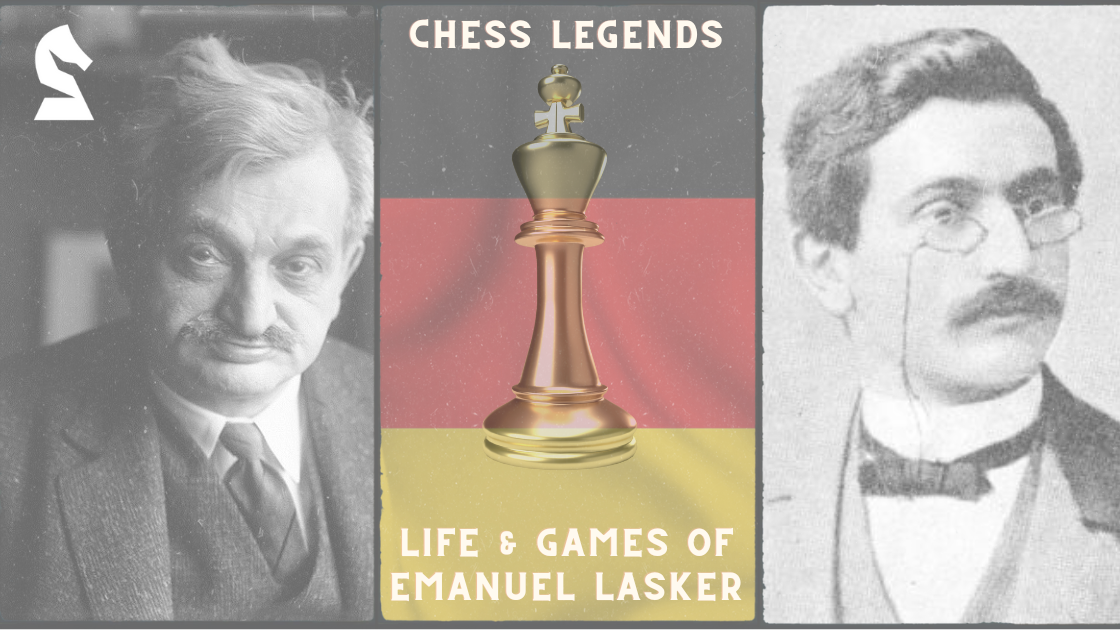Decoding Life & Games of Chess Legends: Emanuel Lasker

In this blog, we will be discussing the life and games of the legendary World Chess Champion Emanuel Lasker. We highly recommend that all readers aspiring to be like Lasker read the entire blog.
To kick off the blog, we have included an interactive quiz inspired by Lasker's games. Click the button below or the quiz icon on the right-side tab to start the quiz. Best of luck to all participants!

Emanuel Lasker (December 24, 1868 – January 11, 1941) was a German chess player, mathematician, and philosopher who held the title of World Chess Champion for 27 years, from 1894 to 1921, marking the longest reign of any officially recognized World Chess Champion in history.
His contemporaries used to say that Lasker employed a "psychological" approach to the game, and some even suggested that he deliberately played inferior moves to confuse opponents.
Recent analysis, however, indicates that he was ahead of his time, using a more flexible approach than his contemporaries, which mystified many of them.
While Lasker was well-versed in contemporary analyses of openings, he often disagreed with them. He published chess magazines and five chess books, but later players and commentators found it challenging to extract lessons from his methods.
Lasker also made significant contributions to the development of other games. He excelled as a contract bridge player and wrote about the bridge, Go, and his own creation, Lasca. His books on games presented problems that are still considered notable in the mathematical analysis of card games.
Greatest Games Played By Lasker
Below is the interactive PGN embed of some of the best games played by Emanuel Lasker over the years.
(Open the blog link to view the games, preferred in Desktop)
Lasker's Life and Career
The Early Years: 1868–1894
Emanuel Lasker, depicted as a young man, was born on December 24, 1868, in Berlinchen, Neumark (now Barlinek in Poland), to a Jewish cantor.
At the age of eleven, he was sent to Berlin to study mathematics, where he resided with his brother Berthold, who was eight years his senior and taught him chess. Berthold was among the world's top ten players in the early 1890s.
To supplement their income, Emanuel Lasker engaged in chess and card games for small stakes, notably at the Café Kaiserhof.
In 1888/89, Lasker emerged victorious in the Café Kaiserhof's annual Winter tournament and also secured victory in the Hauptturnier A (the "second division" tournament) at the sixth DSB Congress held in Breslau. This win granted Lasker the esteemed title of "master."
The candidates were divided into two groups, and the top four from each group advanced to a final round. Despite trailing the leader, Viennese amateur von Feierfeil, by 1½ points with two rounds to go, Lasker clinched victory by winning both final games while von Feierfeil faltered. Lasker then won a playoff, securing the master title and paving the way for his chess career.
Lasker achieved second place in an international tournament in Amsterdam, surpassing Mason and Gunsberg. He further solidified his prowess by winning two tournaments in London in the spring of 1892, the latter without losing a single game.
His success extended to matches as well. From 1889 to 1893, Lasker exhibited dominance, drawing only a short playoff match against his brother Berthold and triumphing in all other matches against esteemed opponents such as Curt von Bardeleben, Jacques Mieses, Henry Edward Bird, Berthold Englisch, Joseph Henry Blackburne, Jackson Showalter, and Celso Golmayo Zúpide.
In 1892, Lasker established his first chess magazine, The London Chess Fortnightly, published from August 15, 1892, to July 30, 1893. However, ten weeks elapsed between issues in the second quarter of 1893, purportedly due to printer issues. Subsequently, Lasker embarked on a journey to the United States, where he spent the ensuing two years.
Lasker issued a challenge to Siegbert Tarrasch, the victor of three consecutive strong international tournaments, for a match. Tarrasch arrogantly declined, asserting that Lasker should first prove himself by winning one or two major international events.
To access the entire blog, subscribe to our premium plans today and elevate your chess game to the next level. Get ChessX for all things chess